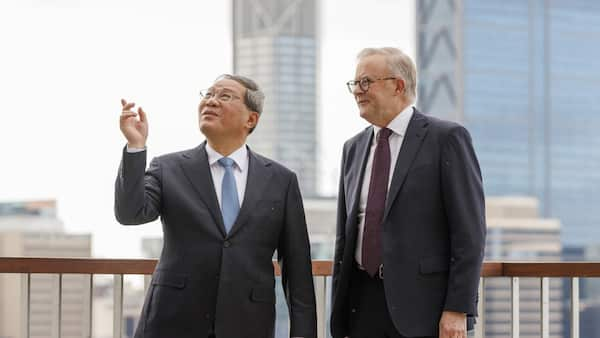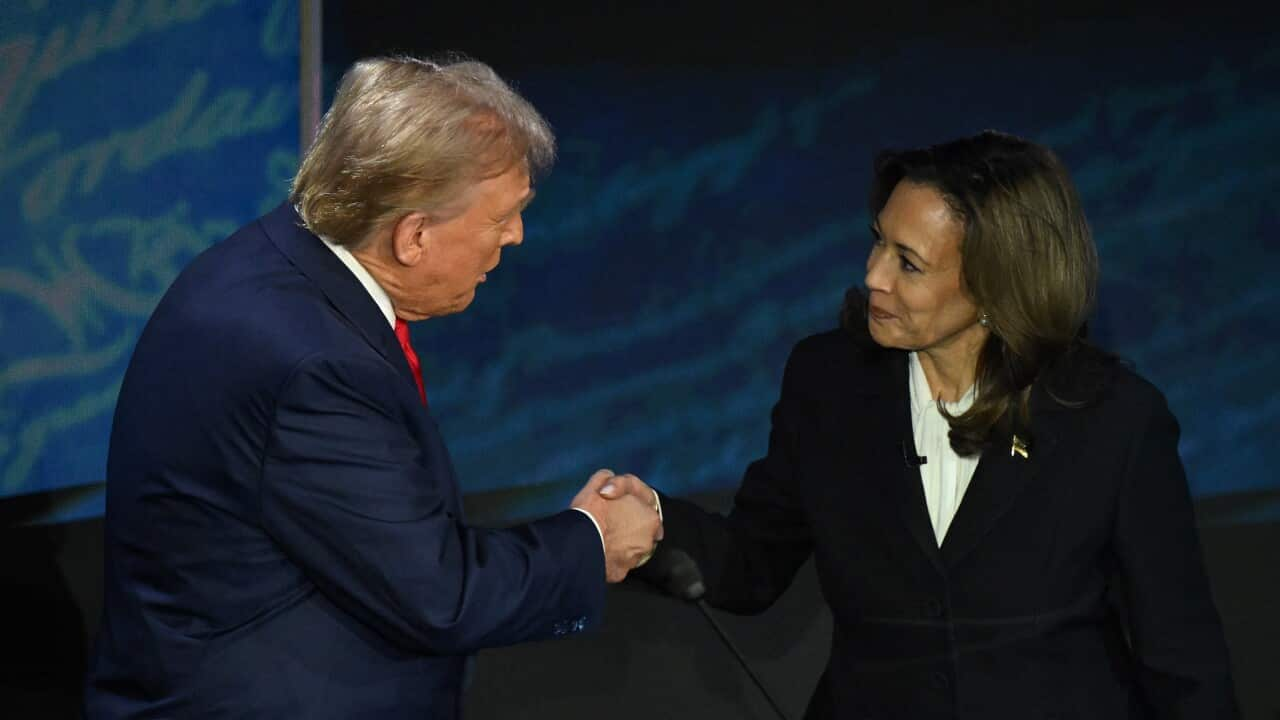In recent months, Democratic candidate Kamala Harris and Republican Donald Trump have sought to draw stark lines about the change they'd bring to the White House if victorious in the United States presidential election.
That has prompted both major-party candidates to stake out — or at least give some indication of — such as the economy, abortion, foreign policy and migration.
However, the lines are less distinct when it comes to what the result of the 5 November ballot will mean for Australia, some experts have told SBS News.
Samuel Garrett, a research associate at the United States Studies Centre, said the difference between a Trump and Harris administration would be relatively minor when it came to its impacts on Australia.
"Even though they have vastly different rhetoric and domestic policies when it comes to the issues that matter most to Australia, there's really surprisingly little difference between the two," Garrett said.
Emma Shortis, senior researcher in international and security affairs at public policy think-tank the Australia Institute, is of a somewhat different opinion.
Compared to Harris, a White House with former president Trump in the Oval Office would have "very different relationships" with the rest of the world, including allies like Australia, she said.
The alliance and geopolitics
In 2021, Australia and the US marked 70 years of the Australia, New Zealand, and United States (ANZUS) treaty.
Experts generally agree that the US and Australia's close and long-running security relationship would be uninterrupted if vice president Harris wins the 5 November race.
For some, a second Trump presidency would come with far more question marks.
"The assumption is usually … that Australia needs to remain close to the United States no matter what it does, and no matter who is in charge," Shortis said.
"I think the sense that the alliance is kind of settled and bipartisan and above domestic politics will be eroded by a Trump administration.
"If Trump is using the National Guard against its own people and describing [them] as 'enemies from within' or even 'vermin', as he does, what does it mean for that relationship?"
In late October, Trump suggested deploying the military or National Guard to handle the risk of "the enemy within", such as "radical left lunatics", causing chaos on election day.
"What room do we have to move in that relationship, and do we want to continue to have such an intimately close security relationship with that kind of American administration?" Shortis questions.
While Garrett said a Trump victory could raise some geopolitical questions for Australia, he doesn't expect to see any "fundamental shift" in the alliance.
"One of the few issues that still attracts largely a bipartisan consensus in the US is US engagement in Australia's region, in the Indo-Pacific, and particularly US competition with China," he said.
"We saw with the Quad Grouping, for example, which was re-established and formalised by Trump in 2017, and then once Biden was elected, Garrett said.
"From the US perspective, these alliances and partnerships with Australia and with other US allies in the region, they're broadly supported by both Trump and Harris — even though there are these differences in rhetoric."
Citing US Studies Centre public opinion polling, Garrett said most Australians "want to remain in the US alliance, even if Trump wins in November".
LISTEN TO

What will the US Presidential Election mean for the rest of the world?
SBS News
28/10/202415:03
The AUKUS agreement
One of the key pillars of the US-Australian alliance is the AUKUS agreement —
Former Republican Party security adviser and US ambassador to the United Nations John Bolton recently warned in an interview with 7NEWS that AUKUS could be torn up if Trump wins another term.
Prime Minister Anthony Albanese has previously downplayed such concerns, saying in late September that the US-Australian relationship was "not just a relationship between individuals" but based on "common values".
Garrett said AUKUS was something that was "broadly supported by both Trump and Harris".
Shortis agreed, saying: "Trump would probably be fine with the AUKUS submarine pact."
"Why wouldn't he be when Australia is handing over $368 billion-plus, probably — at a minimum?" she said.
Members of the and China has said it would
Trade
US economic policy could also have some impact on Australia — especially as it affects trade relations with China.
China imposed sanctions after the former Coalition government called for an independent inquiry into the origins of the COVID-19 pandemic.
Since Albanese took office in 2022, China has gradually loosened these sanctions.
LISTEN TO

Are things looking up for the Australia-China relationship?
SBS News
18/06/202406:35
Shortis highlighted Trump's "belligerent promises" about putting tariffs on Chinese goods coming into the US, saying this would come with implications for "Australia's relationship with China and our place in the global economy".
Trump's threat of a 50 to 60 per cent tariff increase on imports from China would take the average US tariff rate from around 2.5 per cent to around 17 per cent — a level not seen since the 1930s, according to a recent paper by AMP chief economist Shane Oliver.
However, both Shortis and Garrett said US tariffs on China are likely to increase regardless of who wins.
"The Biden administration has quadrupled tariffs on Chinese-made electric vehicles. Harris is unlikely to walk that back," Garrett said.
"Trump said that he would implement huge tariffs, as high as 20 per cent, on all imports into the US, and we saw that the Biden-Harris administration actually kept most Trump-era tariffs when they came back into office."
Climate
The US is the world's second-largest emitter of greenhouse gases and has significant diplomatic and economic clout.
As such, any major shift in US climate policy would have implications for Australia — a nation
Trump has called climate change "one of the greatest scams of all time" and pulled the US out of the Paris climate accord during his first term in office. President but Trump has pledged to withdraw again if re-elected, according to US media reports.
He's also promised to end federal support for clean energy — something that Biden made a even as US oil and gas production soared to record highs.
Harris — who has called climate change an "existential threat" — is expected to largely continue Biden's climate policies.
However, when it comes to US-Australian co-operation on climate policy, the implications of the election are less clear.
"Trump will be very likely to walk away from the Australia-US Climate Compact, which President Biden and Prime Minister Albanese signed in 2023, and which they declared the third pillar of the Australia-US Alliance," Garrett said.
"We'll almost certainly see that be air-brushed out of history if Trump is re-elected, at least for his time in office.
"But that said, a lot of the substance of the Climate Compact is likely to be preserved, particularly aspects regarding things like critical minerals co-operation, which take up a very significant aspect of that agreement."
Garrett said while a Trump administration could "stall deeper climate co-operation between Australia and the US" and "could be damaging to public views of the US in Australia … there are a lot of ways in which co-operation will continue regardless of whether or not Harris or Trump is re-elected".
We'll almost certainly see that be air-brushed out of history if Trump is re-elected...Samuel Garrett, research associate, United States Studies Centre
Shortis said that, if Trump was elected, the compact was likely to be low down on Trump's priority list — if it received any attention at all.
"Certainly, if it wasn't deliberately undone or unwound, I would predict that it would be ignored," she said.
"It certainly would not be a priority for the relationship or for the US' role in our region more broadly."
On the other hand, Shortis views a Harris administration as offering new opportunities for climate co-operation between Australia and the US.
"The Biden administration has made significant promises to the Pacific around this issue.
"I think there'd be an opportunity for Australia and for the Pacific really to hold a Harris administration to account in that sense and to work in genuine partnership with the Pacific and our region on the things that really do threaten us."
Want more politics? You can stream poignant political documentaries in the and keep up with daily news bulletins in the SBS On Demand US Election Hub.











